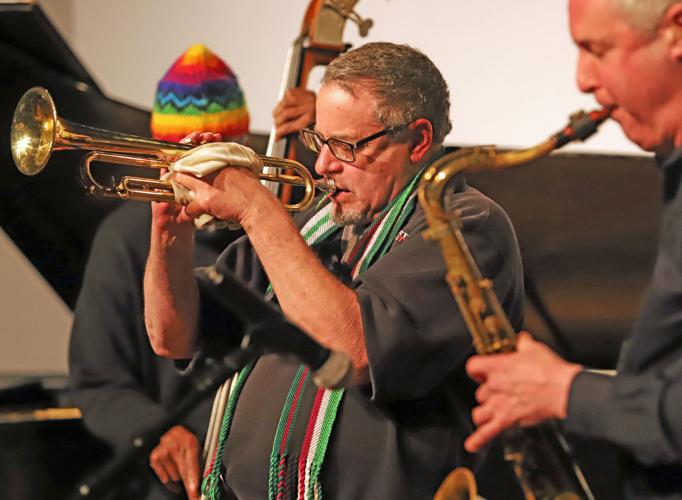BENNINGTON — Bennington College celebrated the fiftieth anniversary of the college’s influential, improvisational Black Music Division this weekend with a symposium of events, history, and music surrounding the 1974 beginnings of the groundbreaking program.
The weekend program brought together alums, musicians, faculty, and students for reflection, performance, discussion, and exploration of the division’s legacy. The event honored the improvisational brilliance of the Black Music Division’s foundational figures, Bill Dixon and Milford Graves, and the transformative influence they have had on the college’s offerings, the lives of students, and the broader landscape of music and culture,” said Michael Wimberly, percussionist, composer, and Bennington College faculty member who organized the symposium.
“I’m thrilled to share this moment with so many talented artists and students who continue to carry this tradition forward."
Wimberly stated that the program aimed to celebrate and reflect on the history of this program and to encourage the next generation to remember and recognize the teaching, curriculum inspiration, and innovation created by musicians and educators here at Bennington College beginning in 1974. Several former faculty members and students dating back to the program's genesis were in attendance, with many joining in on stage for performances and jam sessions throughout the weekend.
Participants at the Deanne Carriage Barn, some of whom have been on the cutting edge of improvisational jazz music for the last fifty years, have played with some of the top musicians in the world. Those musicians included Stephen Haynes, Jackson Krall, Glynis Lomon, William Parker, Vance Provey, Lisa Sokolov, and Dennis Warren, among the many other improvisational jazz legends that roamed the halls of the program as alumni and students throughout its long history.
The Black Music Division at Bennington College was founded in 1974 by Bill Dixon, a trumpet virtuoso who sought to legitimize Black Music within the academic sphere. Dixon succeeded in creating a division dedicated to its study and left an indelible mark on the institution and music in America. Current faculty continue to honor the legacy of the Black Music Division by offering courses that explore the depth and cultural significance of Black music.
Wimberly, a percussionist and teacher who has been a music faculty instructor at the college for the past 13 years, is responsible for putting together the weekend symposium.
“That old saying, ‘you don’t know where you’re going unless you know where you’ve come from,’ is what this is about. These students are curious about what happened before their time. Fifty years is a long time. They’re here from all walks, all over the world, interested in the music, innovation, and African-American experience. There are legends in this room right now.”
When asked why it’s essential to have programs like Black Music in 2025, Wimberly took a few seconds before answering.
“It’s interesting to watch what’s happening right now,” Wimberly said. “Many are trying to erase certain history, but you cannot erase the present. Right now, there are still many people who are conscious. If some might label that WOKE, then that’s their problem. Students want information. They want the truth, to speak truth to power. You can empower yourself only by knowing the truth. This program is all about the truth and discovering for yourself. That’s why we are here.”
Bennington College President Laura Walker, echoed that sentiment, especially about what programs like this can mean for liberal arts.
“At this particular moment in our country, this program is a shining light of what a liberal arts college education can provide. This program has influenced so many musicians and scholars. It’s something we are really proud of. It’s extremely important. An event like this adds another layer of expression and a defense of liberal arts. It has influenced so many.”
“Bennington College was the first school I knew of with a black music program,” said legendary bass player William Parker. “Black music is a direct extension of jazz, more improvisational, open to new music. It wasn’t about teaching bebop or swing music. It was about music that led you not just to copy tradition but also to create a new tradition based on how each individual heard music. That is the difference. That is what was happening here.”
“If you didn’t know what was happening at Bennington, you didn’t know what was happening,” added Joe Morris, Jazz guitarist, who attended the school in the seventies.
Vermont State Representative Will Greer, a recent graduate of Bennington College, presented a proclamation from the Montpelier Legislature celebrating the anniversary of the long-running program and its significance.
The Black Music Division offers the art, philosophy, and technology of Black Music to the entire student body at an introductory level. Simultaneously, it provides a more specialized discipline for those who have committed themselves to performance, composition, improvisation, or music criticism. The primary purpose of the program is to both preserve and advance the art and discipline of contemporary Black Music - teach both its musical and philosophical points of view, and to train and engage the young musician in a specific musical discipline - acquaint the student musician with the art of ensemble playing, composition, how to listen with a critical ear, development in the art of the solo, involvement with the intricacies of the instrument, and for writers how to write critically and intelligently about the music.
Bennington College, located on the western edge of Bennington on 440 acres, is a private liberal arts college founded in 1932 as an all-girls school. In 2024, U.S. News & World Report ranked Bennington112th in National Liberal Arts Colleges, 19th in Most Innovative Schools, and 96th in Top Performers on Social Mobility out of 211 National Liberal Arts Colleges. The school became co-educational in 1969.







